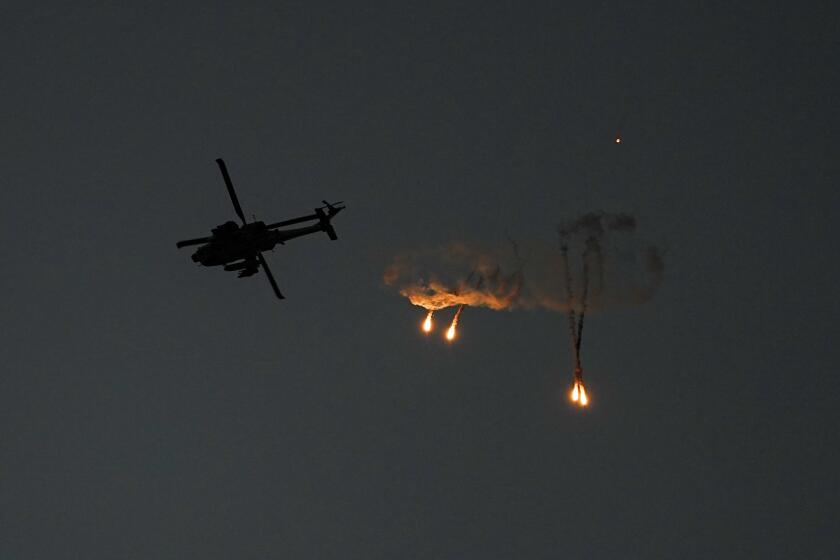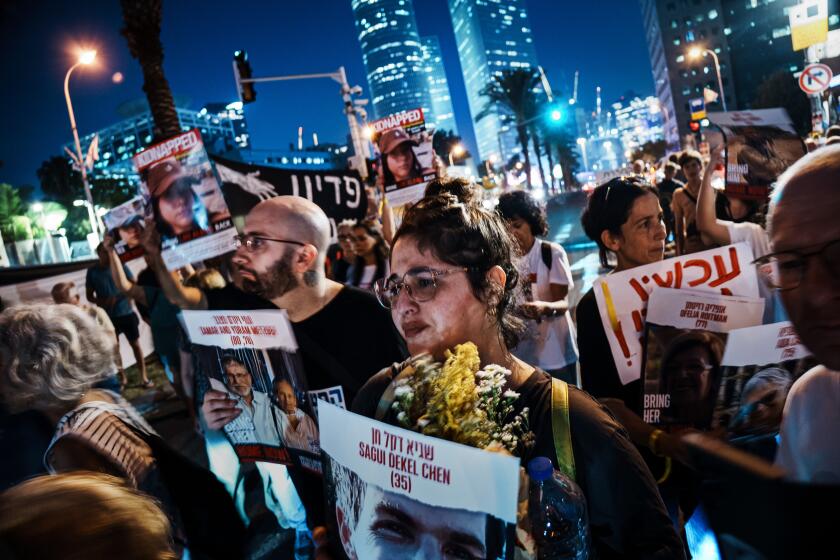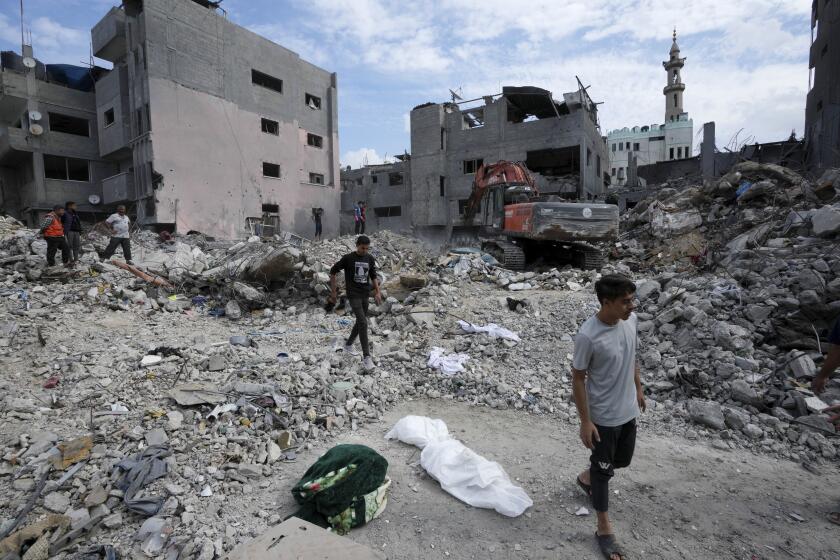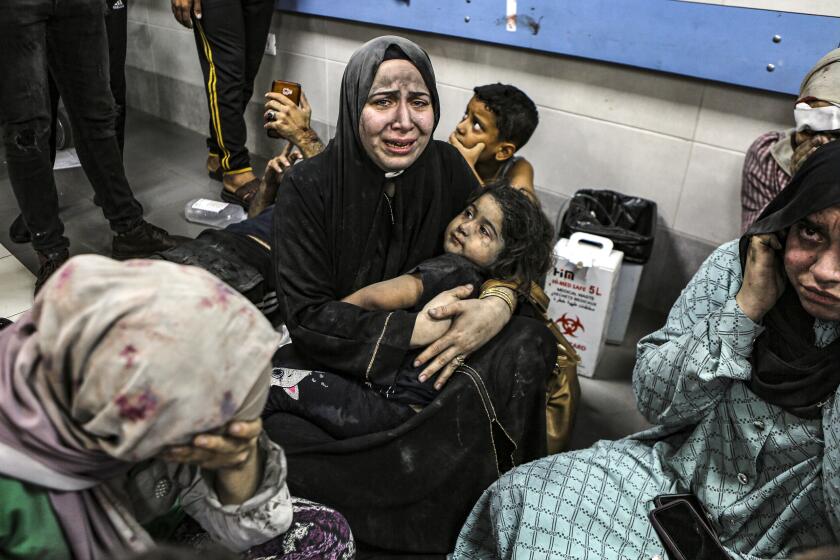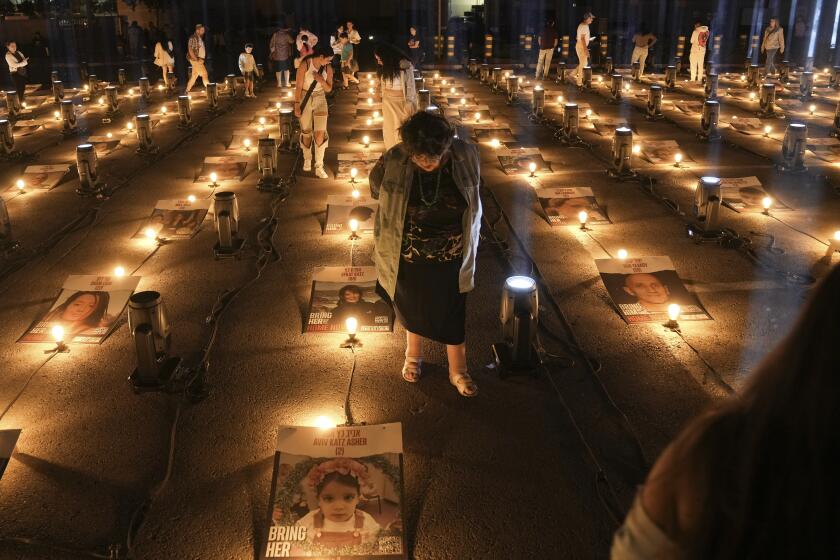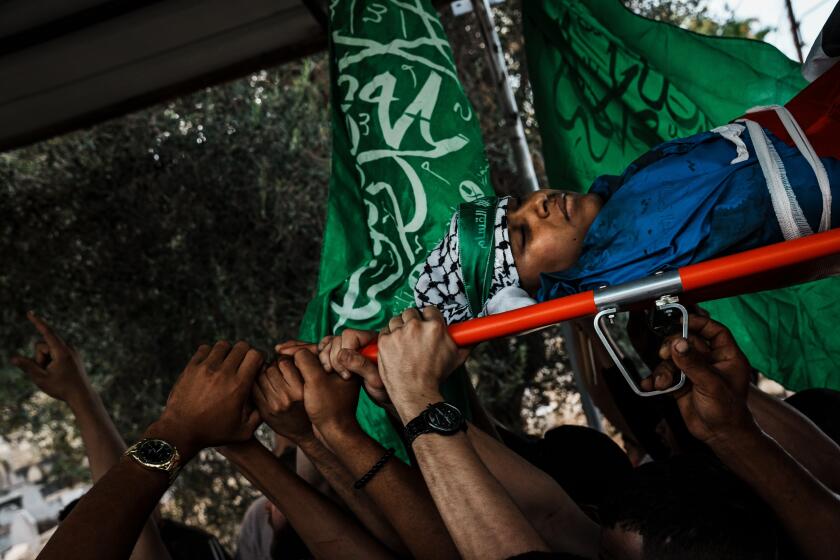Their families wiped out in Gaza, grieving Palestinians ask why
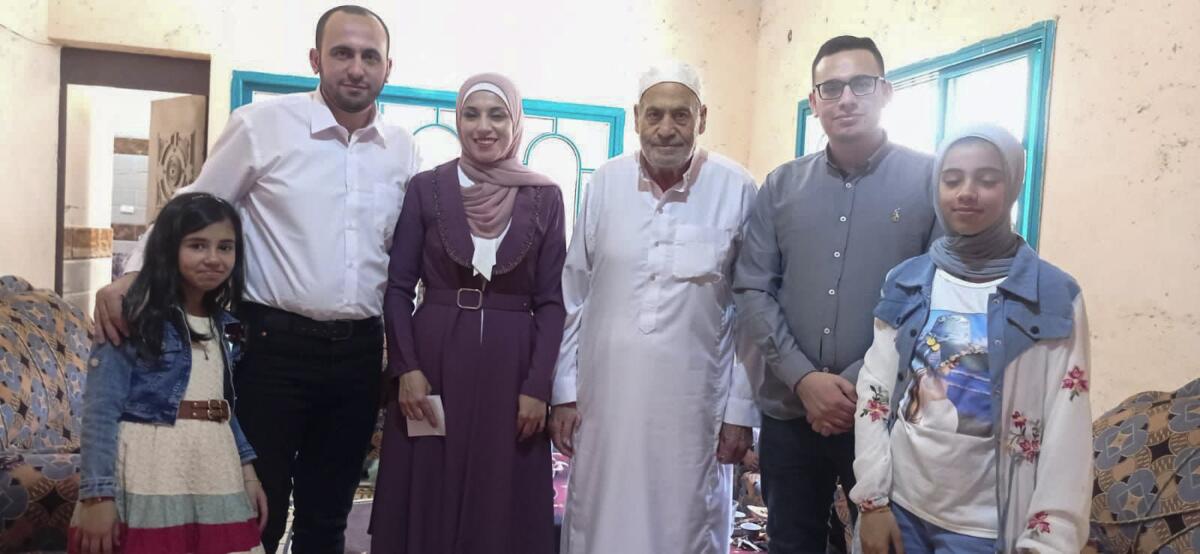
- Share via
KHAN YUNIS, Gaza Strip — The night a blast struck his family’s home in the Gaza Strip, Ahmed al Naouq was more than 2,000 miles away but he still jolted awake, consumed with inexplicable panic.
He reached for his cellphone to find that a friend had written — and then deleted — a message. Al Naouq called him from London. The words that spilled from the other end of the line landed like world-shattering blows: Airstrike. Everyone killed.
Four nights later, Ammar al Butta was startled from sleep in the southern Gaza city of Khan Yunis when the wall of his bedroom collapsed over him. A missile had pierced his top-floor apartment and exploded one floor below.
He lurched over the rubble, shining the light of his cellphone into the wreckage, calling out to his 16 relatives.
“Anyone there?” he cried. There was only silence.
Entire generations of Palestinian families in the besieged Gaza Strip — from great-grandparents to infants only weeks old — have been killed in airstrikes in the Israel-Hamas war, in which the Israeli army says it aims to root out the militant group from the densely populated coastal territory.
A Times special correspondent in Gaza offers a personal account of living in a place where nowhere feels safe.
Attacks are occurring at a scale never seen in years of Israel-Hamas conflict, hitting residential areas, schools, hospitals, mosques and churches, even striking areas in southern Gaza where Israeli forces ordered civilians to flee.
Israel says the goal of the war is to destroy Hamas after the Oct. 7 rampage in southern Israel in which militants killed at least 1,200 people and took more than 200 hostages, according to Israel. The Israeli military says its attacks in Gaza target militant operatives and infrastructure.
Israel-Hamas war: In a national vigil of sorts, Israelis hope for the return of more than 220 people seized by militants and believed held in Gaza.
It blames the high death toll — more than 11,000 people, according to the Gaza Health Ministry — on Hamas, saying the group endangers civilians by operating among the population and in tunnels underneath civilian areas. Israel says the death toll includes Hamas fighters.
But the scope of the destruction and loss of life in Gaza, with entire families wiped out in a single strike, has raised questions about Israeli military tactics.
Generations lost
It would take many hours for the truth to settle like the ash from the Oct. 22 explosion that leveled Al Naouq’s family’s home: 21 relatives killed.
They included his 75-year-old father, two brothers, three sisters and their 13 children.
“I can’t believe this actually happened,” Al Naouq, a graduate student in London, told the Associated Press. “Because if I calculate what it means, I will be destroyed.”
His father, Nasri, had recently told him that the home of Al Naouq’s sister Aya had been destroyed and she was staying with the others elsewhere in the central city of Deir al Balah, south of the area Israel had ordered Palestinians to leave.
A home can be rebuilt, Al Naouq recalled replying, all that matters is that she and the children are alive.
But just hours later, they were all dead: Wala’a, the most accomplished of the Al Naouq children with a degree in engineering, and her four children; Alaa and her five children; Aya, known for her wry sense of humor, and her three children; older brother Muhammed; and younger brother Mahmoud, who was preparing to travel to Australia for graduate studies when the war broke out.
Nine of the 21 are still under the rubble; dire fuel shortages prevented civil defense crews from digging them out.
Rescuers in Gaza don’t have the equipment, manpower or fuel to search properly for the living, let alone the dead buried among mounds of rubble.
Identifying the dead was another traumatizing endeavor; many bodies were unrecognizable, most were in pieces.
Al Naouq’s sister, Doaa, who was not in the house at the time of the strike, told him she couldn’t bear the smell of the rotting flesh of their loved ones under the rubble. Someone showed her body parts retrieved from the site and told her it was one of their sisters.
There were two survivors: Shimaa, Al Naouq’s sister-in-law, and Omar, his 3-year-old nephew. His 11-year-old niece, Malaka, was taken to Al Aqsa hospital with severe burns but died after doctors gave her ICU bed to another patient with a better chance of survival, Doaa said.
Doctors have to make extraordinarily difficult triage decisions, and severely wounded patients are being left to die because of shortages of beds, medical supplies and fuel, said Dr. Mohammed Qandeel, in Nasser Hospital, Gaza’s second-largest.
“We leave most as we don’t have ventilators or beds,” he said of patients in need of intensive care with complicated blast wounds. “We’ve reached full collapse.”
Competing claims
Israel doesn’t say how it chooses targets in densely populated Gaza. But Israeli officials say many strikes on homes are based on intelligence assessments that wanted Hamas operatives are inside. Though it gives few details, Israel says every airstrike is reviewed by legal experts to ensure they comply with international law.
Many Gaza families deny any Hamas targets were operating from their homes.
The Health Ministry in Hamas-run Gaza does not distinguish between civilians and combatants, but says a majority of Palestinians killed have been minors and women, about 4,500 and 2,200, respectively. At least 304 families have lost at least 10 relatives; about 31 families have lost over 30, according to a Nov. 6 health ministry report. That number is probably higher now as intense Israeli bombardment has continued.
Among the families with the highest number of casualties, many have been children.
Israel and the Palestinian militant group Hamas appear set to go head-to-head on the ground in Gaza. What’s each side’s endgame?
The Al Astal family lost 89 relatives, 18 of them children under the age of 10, including three babies not yet a year old, according to an Oct. 26 ministry report. The Hassouna family had 74 killed, including 22 children ranging in age from 1 to 10 years old, it said. The Najjars lost 65 relatives: More than 20 were under 10 years old, including 13 under 4, the ministry report said.
Ammar al Butta says his relatives were all civilians with no links to Hamas.
The Saqallah family, his cousins known for their sweet shops in Gaza City, had taken shelter with Al Butta’s family in their four-story house in Khan Yunis, in southern Gaza, heeding Israeli evacuation orders.
The family arrived with trays of confections for their hosts. Joking with his cousins in the family’s living room was a rare moment of respite in the fog of war and displacement, the 29-year-old teacher said.
One cousin, Ahmed Saqallah, 42, spoke of rebuilding his family’s bomb-damaged home and looked forward to fixing the plumbing and painting.
“Simple, sweet dreams,” Al Butta said.
Ten days later all 16 Saqallahs, from 69-year-old Nadia to baby Asaad, not yet a year old, were killed in the Oct. 24 predawn attack.
Unanswered questions
A question left by Al Naouq in his family’s WhatsApp group the night the blast leveled their home — “Tell me, how are you guys?” — remains unanswered.
The distance has made the devastating news all the more surreal. Observing London’s peaceful nights, where sounds of mirth resonate from restaurants and bars, Al Naouq imagines the airstrikes lighting Gaza’s skies, the screams of panicked residents. His family, lying lifeless under the rubble.
He has no idea where his relatives’ bodies are buried. There was no space in the hospital morgue to keep them. They could be in a mass grave, but Al Naouq has no way of knowing.
Al Butta said the Saqallah family was buried in his family grave in Khan Yunis. The entire neighborhood mourned when they were interred. “Our eyes are dry,” he said. “There are no tears left.”
Weeks after Hamas militants paraded her nearly naked body, young Israeli festival-goer Shani Louk is confirmed dead. Many families still await news of their loved ones.
In the chaos of the war, taking account of the dead is a rushed, heart-rending process.
It begins with relatives scribbling the names of the dead and missing. They dig into the rubble with their hands, calling out for survivors. Hospitals later issue death certificates.
Grieving relatives, who maintain no one in their households had links to Hamas, ask: Why them?
“Why would they kill children and an old man?” asked Al Naouq. “What is the military justification for bombing my house? They were all civilians.”
“I wish, one day, I can meet the one who pulled the trigger. I want to ask him: Why did you do it?”
Kullab reported from Baghdad, Jobain from Gaza.
Violence surges in the West Bank as Israel increases raids to root out militants. Palestinians say the military is using the war as an excuse to crack down.
More to Read
Sign up for Essential California
The most important California stories and recommendations in your inbox every morning.
You may occasionally receive promotional content from the Los Angeles Times.
